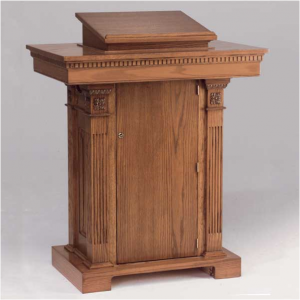==========================
SEEKING THINGS ABOVE
“If then you were raised with Christ, seek those things which are above,
where Christ is, sitting at the right hand of God. “(Col. 3:1)
Volume 3 Number 2
May 2022
==========================
Sister Peter
Sewell Hall

Fifty years ago, it was easier to remember the names of Christians than it is now. Every man’s first name was “Brother” and every woman’s name was “Sister.” Now, most people are known by their given names almost exclusively. We must return, however, to the old custom in designating the wife of Peter because we have no clue as to her personal name.
Peter’s wife is only mentioned in connection with her mother being healed by Jesus (Matthew 8:14-15) and in Paul’s defense of his own right to be married. Paul says, “Do we have no right to take along a believing wife, as so also the other apostles, the brothers of the Lord, and Cephas?” (I Corinthians 9:5). The only other possible reference to her is Peter’s statement in closing his first epistle: “She who is in Babylon, elect together with you, greets you” (I Peter 5:13), but the identity of that woman is uncertain.
Do you suppose Peter’s wife resented the fact that she is only mentioned in connection with her mother and her husband? Somehow we doubt it. In fact, it may be that Peter thought of his wife as he wrote, “Do not let your adornment be merely outward — arranging the hair, wearing gold, or putting on fine apparel — rather let it be the hidden person of the heart, with the incorruptible beauty of a gentle and quiet spirit, which is very precious in the sight of God” (I Peter 3:3-4) A “gentle and quiet spirit” does not resent being identified primarily as the daughter of a serving mother or the wife of a godly husband.
Qualities Implied
First, according to Paul, she was a believer or, as the King James Version puts it, “a sister.” That is significant. Had she been otherwise it would surely have limited Peter’s usefulness.
She must have remained at home while Peter followed Jesus around the country. Peter said to Jesus, “See, we have left all and follower You” (Mark 10:28). This surely does not mean that Peter totally abandoned her, contrary to the teaching of I Corinthians 7:2-5.
She and Peter lived in Capernaum, the very town where Jesus lived (Matthew 4:13). This would mean that, even while accompanying Jesus, Peter would have been often in Capernaum with his wife, perhaps having Jesus as their guest. It does mean, however, that there were times when she had to remain at home without him, perhaps caring for her mother or for her children; in doing this, she was serving Jesus as surely as those women who traveled with Him and “provided for him from their substance” (Luke 8:2-3).
After the church began, Peter was an elder (I Peter 5:1). Few people outside an elder’s family realize the strain this places on his wife. Once again, she most certainly did not have her husband to help her as often as many other women had their husbands. And it is too much to suppose that when Paul remained with Peter for fifteen days (Galatians 1:18), she helped provide the hospitality expected of every Christian (I Peter 4:9) and especially of elders (I Timothy 3:2)? Think of the pain she must have suffered when Herod had Peter arrested intending to put him to death as he has James (Acts 1:1-4).
The pain would not have come from outsiders only. She must have heard the “complaint against the Hebrews by the Hellenists because their widows were neglected in the daily distribution” (Acts 6:1), and her husband was one of the men being criticized. We might wonder, too, if she was present with Peter when Paul “withstood him to his face” (Galatians 2:11) and rebuked him “before then all” (Galatians 2:14). Such complaints against a husband are often more difficult for the wife than for him, and if she is not possessed of a “gentle and quiet spirit,” she can be disruptive to the peace of a congregation and an embarrassment to her good husband. But there is no hint of such misconduct from sister Peter.
Paul’s rebuke of Peter took place in Antioch, but as noted above (I Corinthians 9:5), Peter’s wife accompanied him on his travels in later years. We rather like the King James translation that says that Peter led her about. That well describes what preachers often do, and Peter was no exception. The wife of a preacher, who is eager to serve where she is most needed, may well be led about into some pretty strange and unpleasant places. Some preachers are prevented from going where they feel they should go because of a wife who is unwilling to be led about where she does not wish to go. Apparently, such a wife did not hinder Peter.
Final Thought
In listing important women in God’s service, we may well forget the “gentle and quiet” woman who lovingly supports her husband in the work that she does. Sister, we may not know your name; by many you may only be known as “the preacher’s wife.” “But God is not unjust; he will not forget your work and the love you have shown him as you have helped his people and continue to help them” (Hebrews 6:10).
__________
“I Do Not Permit a Woman to Teach”
Mike Johnson

The above statement is in I Timothy 2:11-12. The verses say, “Let a woman learn in silence with all submission. And I do not permit a woman to teach or to have authority over a man, but to be in silence.” Many may be surprised to learn that these verses are in the Bible, and those who realize they are there are often unwilling to apply them. They argue that we must understand these verses within their “historical context.” These instructions, they say, are temporary regulations that were needful due to the culture of their time. They point out that this teaching does not apply today since we live in a different culture. Therefore, a woman today can do the opposite of what these verses say.
The kind of reasoning employed against the teaching in I Timothy 2:11-12 could also be used to eliminate many other Bible teachings. A person, for example, might say that the Bible teaching about baptism had its roots in the Jewish ceremonial washings and, therefore, baptism has no application for us today. People might also say that they could substitute different elements for the Lord’s Supper due to the unleavened bread and the fruit of the vine having had their origin with the Jewish Passover.
The teaching of this passage is not intended to be temporary. Paul, giving a reason for the earlier instructions, said in verse 13, “For Adam was formed first then Eve.” This reason for the instructions goes back to creation before any particular culture existed. The idea is that it was God’s design from the beginning. (Paul also made the “creation” argument in I Corinthians 11:9 when he said, “Neither was the man created for the woman; but the woman for the man.”) Additionally, nothing in this context shows Paul’s instructions were temporary.
Verse 14 may be a second reason for the instructions of verses 11-12. However, it may be more of an illustration than a reason. The verse says, “And Adam was not deceived, but the woman being deceived, fell into transgression.” This verse is not saying that women are more “gullible” than men and are thus not qualified for spiritual leadership. Instead, he shows the result when the roles given by God become reversed. Both sinned, but Eve sinned first, leading her husband into error. She became the “leader,” and he became the “follower.” Therefore, when she violated God’s order, disaster was the result!
These verses do not prohibit a woman from teaching under all circumstances. Situations, or settings, exist where she can teach. (Please note Acts 18:26; Titus 2:3-5; Col. 3:16; II Tim. 1:5, 3:14-15). However, they do prohibit her from teaching in an authoritative way or an authoritative position over the man. Although the instructions in these verses include the assembly, they are not confined to it.
It is a sad situation when people are so bold as to try to alter a divine directive. We cannot accept passages we agree with and then dismiss the teaching we do not agree with or that does not happen to fit the current culture. We must obey God’s Word!
__________
The Possibility of Apostasy (7)
Take Heed Lest You Fall
(1 Corinthians 10:12)
Mike Johnson
Many teach that once people become Christians, they cannot possibly be lost. This doctrine is known as “Once Saved, Always Saved,” “The Impossibility of Apostasy,” and “The Perseverance of the Saints.” However, this teaching is contrary to many passages in God’s Word; among these is 1 Corinthians 10:12.
In 1 Corinthians 10, Paul is warning the Corinthians against falling away. He tried to encourage them not to be lulled into a false sense of security, thinking they could not fall. To solidify his point, he brings up the Jews (God’s chosen people) who committed sin and received punishment.
To begin with, the children of Israel crossed the Red Sea by faith (Heb. 11:29). Further, God favored them in many ways. According to 1 Corinthians 10, all ate the spiritual food (v. 3); they drank the spiritual drink (v. 4), and the spiritual drink was Christ (v. 4). Yet, these people sinned — they fell from God’s favor. We are told they lusted after evil things (v. 6), they worshiped idols (v. 7), some committed sexual immorality (v. 8), some tempted the Lord (v. 9), and some of them murmured (v. 10).
Why bring this up? It is to warn the Corinthians. Verses 11-12 say, “Now all these things happened to them as examples, and they were written for our admonition, upon whom the ends of the ages have come. Therefore let him who thinks he stands take heed lest he fall.”
Yes, the Corinthians could fall from grace. Why give the warning to “take heed lest” they fall if it was impossible for them to do that? There is no need to warn someone of a danger that does not exist.
__________
How Do We Conduct Our Worship
Dylan Stewart

Congregations often sound and look different one from another. However, one thing that should not vary between congregations is worship. Now, this is not to say that congregations cannot construct, or order, their worship services differently than another group. As long as our actions are approved by God in His word, then our service is acceptable to Him (Psalm 119:160; Col. 3:17). Contrarily, if we do things against God’s law, no matter how much we enjoy or believe what we are doing is “good,” then our service is not satisfactory to Him (James 2:10; Matt. 7:21-23). With this knowledge, it is not the construct of the worship service, but the conduct, or the manner in which we perform our worship, that matters most. Let us examine God’s Word to determine how we should conduct our worship:
- In Spirit and Truth – “God is spirit, and those who worship him must worship in spirit and truth” (John 4:24).
- With Glory and Praise to God – “So, whether you eat or drink, or whatever you do, do all to the glory of God” (1 Cor. 10:31); “Oh come, let us sing to the Lord; let us make a joyful noise to the rock of our salvation! Let us come into his presence with thanksgiving; let us make a joyful noise to him with songs of praise!” (Psalm 95:1-2).
- Not Lip-Service (Free of Hypocrisy) – “You hypocrites! Well did Isaiah prophesy of you, when he said: ‘This people honors me with their lips, but their heart is far from me; in vain do they worship me’” (Matt. 15:7-8).
- In Happiness – “Make a joyful shout to the Lord, all you lands! Serve the Lord with gladness; Come before His presence with singing” (Psalm 100:1- 2); “I was glad when they said to me, ‘Let us go to the house of the Lord!’” (Psalm 122:1). In Thankfulness – “Let the word of Christ dwell in you richly, teaching and admonishing one another in all wisdom, singing psalms and hymns and spiritual songs, with thankfulness in your hearts to God. And whatever you do, in word or deed, do everything in the name of [or by the authority of] the Lord Jesus, giving thanks to God the Father through him” (Col. 3:16-17).
- In Reverence – “Therefore let us be grateful for receiving a kingdom that cannot be shaken, and thus let us offer to God acceptable worship, with reverence and awe” (Heb. 12:28).
- With Regularity – “Not forsaking the assembling of ourselves together, as the manner of some is; but exhorting one another: and so much the more, as ye see the day approaching” (Heb. 10:25).
Does our worship look like this?
__________
Worms for Sale
 It is an old story but is still worth telling. A lark, singing in the high branches of a tree, saw a traveler walking through the forest carrying a mysterious little black box. The lark flew down and perched on the traveler’s shoulder.
It is an old story but is still worth telling. A lark, singing in the high branches of a tree, saw a traveler walking through the forest carrying a mysterious little black box. The lark flew down and perched on the traveler’s shoulder.
“What do you have in the little black box?’ he asked. “Worms,” the traveler replied. “Are they for sale?” asked the lark. “Yes, and very cheap, too; the price is only one feather.”
The lark thought for a moment. “I must have a million feathers. Most of them are quite small. Surely “I’ll never miss one of them. Here is an opportunity to get a good dinner for no work at all.” So he told the man that he would buy just one.
He searched carefully under his wing for a tiny, tiny feather. He winced a bit as he pulled it out, but the size and quality of the worm made him quickly forget the pain. High up in the tree, he began to sing as beautifully as before.
The next day he saw the same man, and once more, he exchanged a feather for a worm. “What a wonderful way to get dinner—and no effort at all!” he thought.
We skip the next day and the next, for we are sure you are way ahead of us. In any event, he lost a feather each day, and each loss seemed to hurt less and less. Finally, after the loss of one of his primary feathers, he could no longer reach the top of the tree, let alone fly up into the sky. The lark no longer sang because he was ashamed of his fallen state.
This is how unworthy habits possess us. First, painfully, then more easily, until at last we find ourselves stripped of all that lets us soar and sing. This is how our freedom in Christ is lost; sacrificing our Christian virtues for pleasures one by one.
(Author Unknown)


